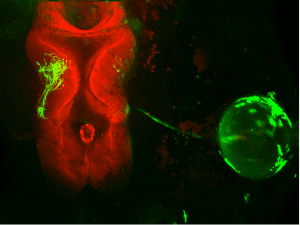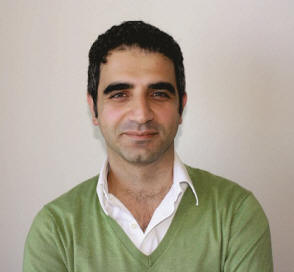This is a tragic and painful time for the Black community all over the world, including here in Canada. The Canadian Association for Neuroscience condemns racism in all its forms. The tragic death of George Floyd and many others obligate all of us to reflect on important questions about systemic forms of racism present in our society today. Continue reading
Author: Julie
McGill Researchers provide real-time evidence that neurons that fire out of sync, lose their link, exploring the mechanisms underlying “Stentian plasticity”

It has long been appreciated that sensory experience helps to refine the connectivity of the brain during development. In 1949, Canadian psychologist Donald Hebb proposed that when different brain cells were consistently active at the same time as one another and acted in synchrony, the connections they formed would be strengthened as a result of their cooperation. This so-called “Hebb rule” for circuit remodeling is sometimes restated as “cells that fire together, wire together.”, and helps explain how the wiring of the brain could be fine-tuned in response to sensory input. Fast forward 70 years and many of the artificial neural networks we rely on today to make accurate predictions from large datasets rely on digital implementations of various learning rules, including variants of Hebb’s rule, that underlie their ability to learn associations. Continue reading
Postdoctoral Position in Neural Circuits – Topolnik Lab, Université Laval
Laboratory of Lisa Topolnik, Neuroscience Axis, CRCHU-CHUL, Laval University, Quebec-city, Canada
A postdoctoral position is available in the lab of Dr. Lisa Topolnik to work on the functional organization of hippocampal inhibitory and disinhibitory circuits. The laboratory conducts both basic and translational neuroscience research in the areas of neural circuits, synaptic plasticity, and intracellular signalling. Our current research program is focusing on the cellular diversity and function of cortical disinhibitory circuits formed by the vasoactive intestinal peptide (VIP) and somatostatin-expressing interneurons as well as interneuron dendritic integration and synaptic plasticity. Our research strategy is based on combination of transcriptomic, physiological, optogenetic, pharmacogenetic and imaging approaches applied to in vitro and in vivo animal models.
A current PDF project will be focusing on exploring the molecular and cellular basis of dendritic integration in GABAergic neurons. We will study the role of inhibition in dendritic input integration in specific types of interneurons in brain slices obtained from transgenic mice in vitro. A novel optogenetic approach based on a combinatorial targeting of specific cell types for selective manipulations will be developed. The data obtained in vitro will then be integrated for in vivo investigation of the network-state dependent recruitment of specific cell types and their functional role in behaving animals. For this part, we will use cognitive and behavioral animal models in combination with calcium imaging and optogenetic cell type-specific interventions.
Candidates should have a PhD in Neurobiology or a related discipline (with a graduation date within the last 4 years), and at least two first-author papers (published or accepted). Prior experience with patch clamp electrophysiology, optogenetics or 2ph imaging in vitro or in behaving animals will be an asset. Full funding provided by the Canadian Institutes of Health Research and the Natural Sciences and Engineering Research Council of Canada is available for up to 4 years. Salary will be commensurate with experience and will include standard benefits as per Laval University regulations.
Contact information To apply: email your CV and cover letter to Prof. Lisa Topolnik. Lisa.Topolnik@bcm.ulaval.ca
Specific brain cells are critical for linking stress controllability and future behaviour

UCalgary researchers discover that a group of ancient cells may play a key role in controlling stress
Stress is ubiquitous, and at no time in recent memory has this been more evident than right now — on a global scale. Our survival depends on our ability to continually adjust and respond to ever-evolving challenges in our world.
Interestingly, how we manage stress now has implications for how we will manage stress in the future. It is not necessarily about the actions we take now, but rather whether we feel our actions give us some control over the outcome during a difficult time. Psychologists and neuroscientists have pondered this ‘stress control’ theory for decades, but how the brain intertwines the perception of controllability of one situation into decisions and actions for future situations has not been well understood. Continue reading
Congratulations to Mihaela Iordanova, winner of the CAN Young Investigator Award

We are very proud to announce that Mihaela Iordanova, from Concordia University, has been named CAN’s 2020 Young Investigator Award winner!
Learn more about this exceptional neuroscientist on Mihaela Iordanova’s Young Investigator Award winner profile page.
COVID-19 assistance on federal laboratory reagents – Round #2
The Public Health Agency of Canada has sent a second call for items and reagents for the public health laboratories
- For loan:
- Thermofisher Kingfisher Flex Purification Systems (automated nucleic acid purification) with the 96- Deep Well head
- Associated plastic consumables (96-well plate blocks) would also be of interest
- For use:
- Laboratory grade Guanidine thiocyanate
As with ‘Round 1” please forward any items to:
Rita Finley (rita.finley@canada.ca)
Public Health Agency of Canada – call for reagents for COVID19 testing
We have been made aware by some of our members that the Public Health Agency of Canada (PHAC) has sent out an urgent request for reagents, specifically RNA extraction reagents for COVID19 testing. If you have such reagents in your laboratory that you could donate (view list below) please consider doing so. If the laboratories have materials that we could use and are not included in the list, feel free to let us know and we will share with the National Microbiology Laboratory and asses their current requirements.
The contact person at the PHAC is Rita Finley (rita.finley@canada.ca). As this is a time-sensitive request please let her know directly what you have available. Continue reading
A study by Martin Lévesque and his team explains the role of dopaminergic neurons in hyperactivity and suggests a mechanism of action for Ritalin
 Read a new article by Université Laval news on a discovery by Martin Lévesque’s team
Read a new article by Université Laval news on a discovery by Martin Lévesque’s team
Cellular cogs of hyperactivity uncovered – Study clarifies the role of dopaminergic neurons in hyperactivity and suggests a mechanism of action for Ritalin
The cellular mechanism uncovered by the researchers could explain the mode of action of Ritalin in humans. The drug is believed to block the reuptake of dopamine by neurons, thereby prolonging the effects of this neurotransmitter.
Although about one in 10 people will suffer from attention deficit hyperactivity disorder (ADHD) in their lifetime, the cellular causes of this health problem are still very poorly understood. A study published in Cell Reports by a team from Laval University’s CERVO Research Centre now sheds some light on the subject. The researchers were able to determine which type of neurons are involved in the development of hyperactivity in mice and the cellular mechanisms involved. This breakthrough suggests a plausible mode of action for Ritalin, a drug widely prescribed for ADHD, but whose mechanism of action is unknown. Continue reading
McGill researchers end decade-long search for mechanical pain sensor

Discovery brings hope for novel pain treatment
Researchers at McGill University have discovered that a protein found in the membrane of our sensory neurons are involved in our capacity to feel mechanical pain, laying the foundation for the development of powerful new analgesic drugs.
The study, published in Cell, is the first to show that TACAN, a highly conserved protein among vertebrates whose function remained unclear, is in fact involved in detecting mechanical pain by converting mechanical pressures into electric signals. Continue reading
Pain hypersensitivity: problem at the pump

Pain hypersensitivity and many other diseases could be associated with a protein that acts as an ion pump in neurons.
The research team led by Yves De Koninck, at Université Laval’s Faculté de médecine and the CERVO Brain Research Centre had already targeted a protein called KCC2 as a key player in the mechanism leading to pain hypersensitivity. A new study published in Nature Communications confirms confirms this lead and reinforces the idea that this protein could be a target of choice for the creation of a new class of analgesics to treat this problem that medicine is often powerless to address. Continue reading





